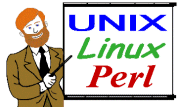
Advanced Shell Programming
4.5 day course

|
|
| Site Menu |
|
Home
About Consultix Training Services Courses �-�UNIX �-�Linux �-�Perl Clients Publications Interviews |
|
" Advanced Shell Programming "
���
4.5 days
Next Public Offering: TBD; Help Us Schedule!� |
�

|
Course Description
This course teaches the use of shell features needed in advanced programs, incorporating such elements as: interactive menus, idiot-proof interaction, option processing, language interpretation, high security, numeric calculations, and client/server design. The techniques that are covered work with the Bourne shell, the Korn shell, and POSIX shells, such as Bash. Also covered are techniques for program debugging and optimization.Benefits
Mastering the shell unleashes the power of the 300+ UNIX utilities to the user or programmer! Knowing how to exploit the advanced features of these shells allows the programmer to solve difficult problems quickly while avoiding the overhead of a compiled language.Who Should Attend
System administrators, programmers, and users who want to make the most of UNIX.Prerequisites
Students should be experienced with one of the following text editors: vi, emacs, or pico (or another locally available editor, for on-site classes). Students should also have familiarity with the hierarchical file system and basic commands such as cd, ls, ln, chmod, grep, ps, & kill, and have at least six months of active experience in Bourne, Korn, or POSIX shell programming.Author & Instructors
Dr. Tim Maher wrote a course on the Bourne shell for AT&T in the early 80s, and taught it for many years. He has written many sophisticated applications in shell languages, including an eight-thousand line user interface used by students at U.C. Berkeley, and a source code beautifier for the C++ language (published in Dr. Dobb's Journal). Tim is a recognized expert on Shell Programming, and as founder and head of CONSULTIX, he regularly teaches courses on a wide variety of UNIX topics.CONSULTIX instructors are renowned for their ability to communicate complex concepts in simple terms and to make the study of dry technical material enjoyable.
Topics
| Argument Handling | Redirection With exec | Construct Redirection |
| The tee Command | Named Pipes | Inter-Process Communication |
| The xargs Command | Shell Functions | Advanced Quoting |
| The Process Hierarchy | Process Boundaries And Shell Constructs | Writing Interpreters |
| Using eval | Parsing Techniques | The set Command |
| The IFS Variable | Handling Signals | Performance Monitoring |
| Optimization Tricks | Debugging Aids | Set-ID Shell Scripts |
| Writing Secure Shell Scripts | Command Line Interpretation | Trojan Horses |
| Numerical Calculations | � | Using sed & AWK In Scripts |